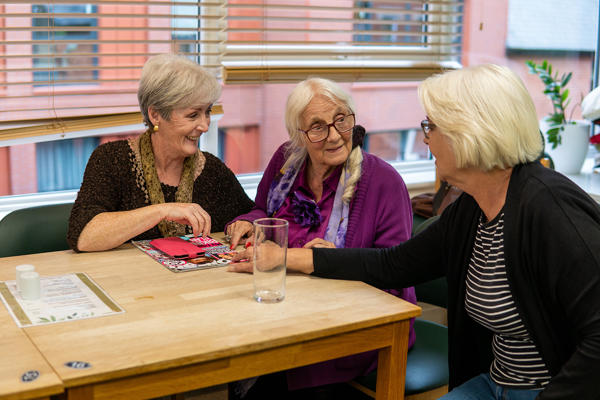A study has found that for every £1 spent on Meeting Centres for people living with dementia in Worcestershire, up to £3 of value can be created.
 Photo Credit: The Centre for Ageing Better Image Library
Photo Credit: The Centre for Ageing Better Image Library
The research, part-funded by the Shaw Foundation and carried out by the University of Worcester based Association for Dementia Studies, examined the social return on investment in the centres and found that investing in community-based care solutions can not only improve outcomes, but pays off financially too.
Meeting Centres are a type of community-based support for families affected by dementia which focus on emotional, social, and practical adjustments so people cope better with the changes dementia brings.
Dr Nathan Stephens, who conducted the research as part of his PhD, said: “One of the main contributors towards Meeting Centres being a net-positive was the continuation of unpaid care by family members who said unanimously that they felt their capacity to continue caring had been increased, so there was less likelihood that they would turn to more costly services in primary and emergency care.”
Worcestershire, through the University of Worcester based Association for Dementia Studies, has pioneered the development of Meeting Centres in the UK.
Dr Shirley Evans, Director of the Association for Dementia Studies, said: “There has been a lot of learning from the Worcestershire project and related research. This has contributed to the growth of Meeting Centres in the UK and in particular in Scotland, with more than 70 either open or under development.”

Following the successful pilot of the centres in 2015 and 2016, Worcestershire County Council provided the initial £540,000 to fund the establishment of a network of ten centres across the county. Since then, several of the groups have transformed into other types of community groups or closed, with a small number continuing.
The study into their benefits found that people living with dementia who used Meeting Centres experienced changes including being and feeling valued, regarded, and close to others in the community.
There were also benefits for unpaid carers, staff, and volunteers who worked at the Meeting Centres, and the Council who initially funded them. The study suggests this type of community support creates £2.28-£3.02 for every £1 invested.
Dr Nathan Stephens said: “It may be that some families have professional care at home, but the Meeting Centres then compliment that. A lot of the costs of care are borne by the family members and the person with dementia, so we can see a reduction of some of the costs for them which is a real result.”
He continued: “Historically there has been seed funding for the centres, where some money is allocated to get the centre off the ground, but we need to think about sustainability from the start. We now need to look at how we adopt some of these findings within local authorities, community-based organisations and the charity sector as well.”
You can read more about the work of the Association for Dementia Studies at the University of Worcester by visiting its website.
For information on courses at University of Worcester visit www.worcester.ac.uk or for application enquiries telephone 01905 855111 or email admissions@worc.ac.uk